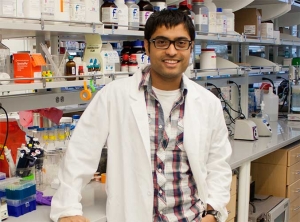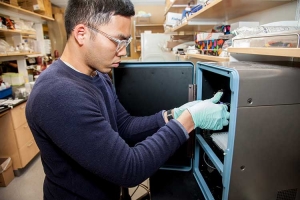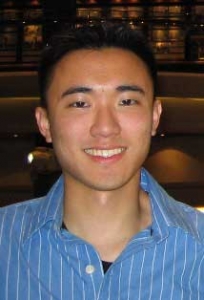UW Bioengineering Ph.D. students Debobrato (Jojo) Das, Pakapreud Khumwan and Jonathan Tsui have received HHMI/Molecular Medicine Scholar Awards. These awards recognize these students’ commitment to research at the interface of basic science and medicine. The awards provide tuition and stipend support for a quarter, and the opportunity to participate in program activities at the UW and with HHMI/Molecular Medicine Scholars at other academic institutions.
 Debobrato (Jojo) Das
Debobrato (Jojo) Das
Jojo’s current research focuses on the design and development of novel polymeric prodrug conjugates for targeted drug delivery against infectious diseases and microbes. In collaboration with clinical mentors, Dr. Shawn Skerrett and Dr. Eoin West, both of whom are UW pulmonary physician-scientists with clinical training in infectious diseases and pulmonary critical care medicine, his research is specifically geared towards engineering nanostructured drug delivery vehicles to provide prophylactic and therapeutic antimicrobial delivery to treat pulmonary biothreat agents. This research opportunity bridges diverse scientific fields, from clinical pathology to microbiology to biophysics, and bioengineering, establishing communications between the realms of applied medicine and biotechnology, the outcome of which is a unified effort that produces high-impact results.
 Pakapreud Khumwan
Pakapreud Khumwan
Pakapreud’s research focuses on a class of biosensors based on silicon photonic technology. In addition to his studies in Associate Professor Daniel Ratner’s research group, he participates the Molecular Medicine Certificate Program (MMCP), and collaborates with UW clinical mentor Dr. Jill Johnsen, a hematologist. He is examining the possibility of detecting other important complex, transmembrane antigens in other diseases by using the RhD, a complex membrane-associated protein, blood group system as a model. He is addressing the challenge of detecting RhD antigen on the surface of red blood cells by developing a technique that rapidly prepares microparticles from human whole blood via a mechanical disruption of the plasma membrane of cells in whole blood. Ultimately, he plans to establish a technique to perform ABO/RhD phenotyping of these microparticles on the silicon photonic biosensors to demonstrate their suitability for clinical applications. He foresees that this microparticle preparation technique could be used to study membrane-bound antigens by technicians who perform routine diagnostic testing in hospital laboratories.
 Jonathan Tsui
Jonathan Tsui
Jonathan’s research in Assistant Professor Deok-Ho Kim’s lab revolves around the comprehensive study of microenvironmental control of cell fate through the development and use of novel biomaterials-based strategies in the context of tissue engineering and regenerative medicine. One of his primary projects seeks to engineer skeletal muscle tissue that is functionally and organizationally mature and is also vascularized. These tissues could then be used to treat chronic muscle injuries or diseases such as Duchenne muscular dystrophy. Towards this aim, he has worked on designing cell culture substrates that not only mimic and reproduce the contact guidance cues provided by the native extracellular matrix, but also are functionalized so that specific and potent signaling biomolecules are presented.



 Debobrato (Jojo) Das
Debobrato (Jojo) Das Pakapreud Khumwan
Pakapreud Khumwan Jonathan Tsui
Jonathan Tsui